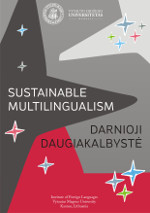Peculiarities of Foreign Language Learning at LUHS, KTU, and ASU: The Students’ Attitude
Peculiarities of Foreign Language Learning at LUHS, KTU, and ASU: The Students’ Attitude
Author(s): Sigita Stankevičienė, Liudmila Kirikova, Irmantas Ramanauskas, Dalia Kačergienė, Edita LatvelienėSubject(s): Foreign languages learning
Published by: Vytauto Didžiojo Universitetas
Keywords: climate of studies; foreign language teaching; problem-based learning; students’ and teachers’ competence
Summary/Abstract: An increasing significance of science, a rapidly growing stream of information, and new cultural and business relationships with foreign countries are but a few factors that affect the education and training of specialists; therefore, providing practical ability to communicate in several foreign languages is one of the major components of today’s education. Continuous updating of specialist knowledge, access to the most recent literature in foreign languages, possibilities for participation in various international conferences and joint projects with foreign partners, and the associated need for foreign languages highlight the relevance of the education and training of specialists who would not limit their activity to work in a concrete sphere, but rather – on the basis of the concept of life-long learning – would be able to cooperate in science and business, communicating in at least one foreign language. The aim of the study was to reveal students’ attitudes to foreign language learning at Lithuanian University of Health Sciences (LUHS), Kaunas University of Technology (KTU), and Aleksandras Stulginskis University (ASU). The objectives of the study were to discuss the theoretical aspects of foreign language learning and to reveal the students’ attitude towards the process of foreign language learning: the teachers’ competence; the climate of studies and the application of the elements of problem based learning. The following methods were applied in the study: analysis of scientific literature and a questionnaire survey. The results of the study showed that most students thought that their foreign language competence was sufficient, while the teachers’ competence was seen as deficient. The main problems about the climate of studies that the respondents indicated were inconvenient schedules and insufficiently interesting studies. Meanwhile, the students’ opinion about the application of the elements of problem-based learning in foreign language studies was favourable.
Journal: Darnioji daugiakalbystė
- Issue Year: 2014
- Issue No: 4
- Page Range: 72-86
- Page Count: 15
- Language: English

